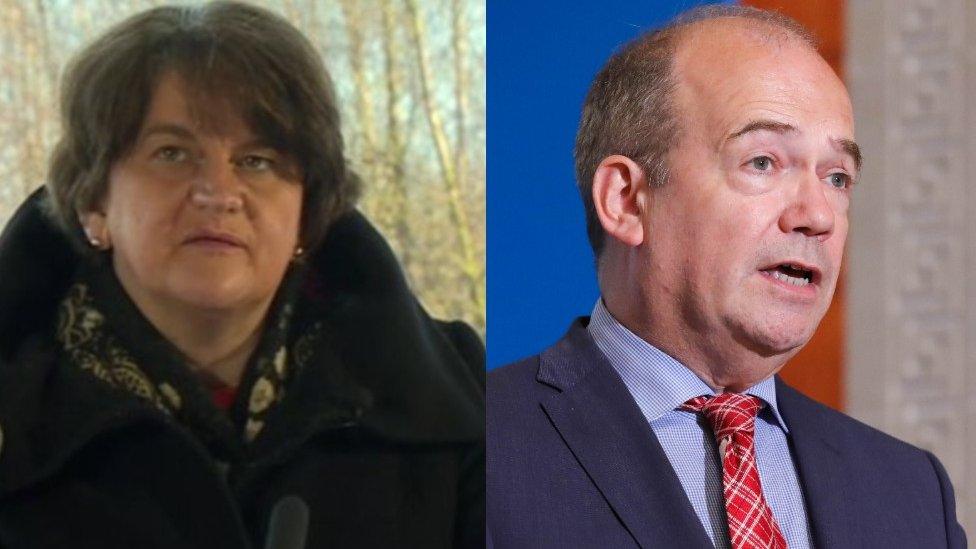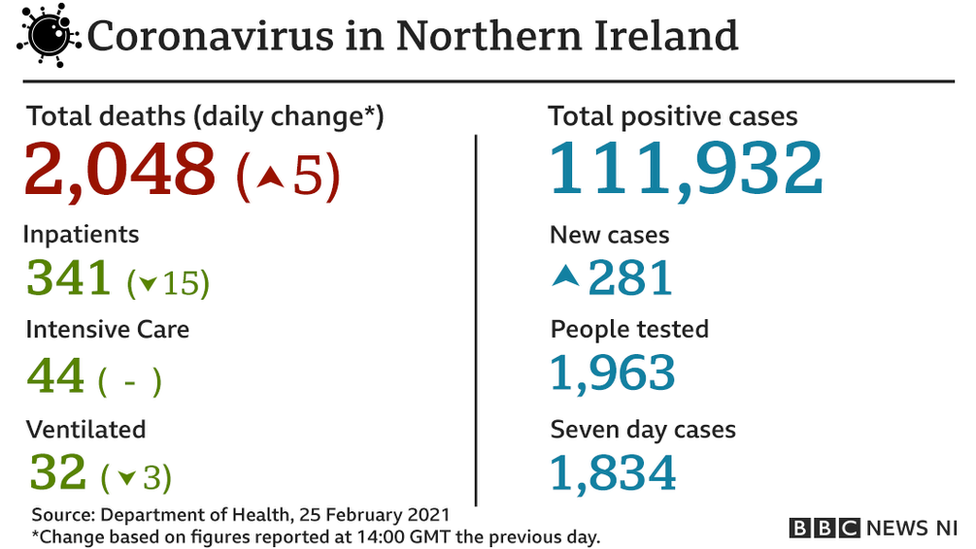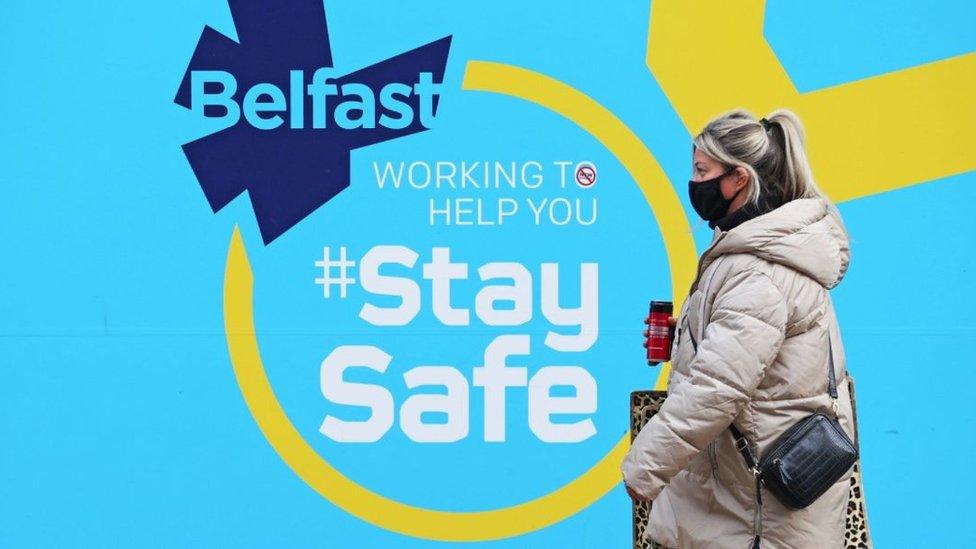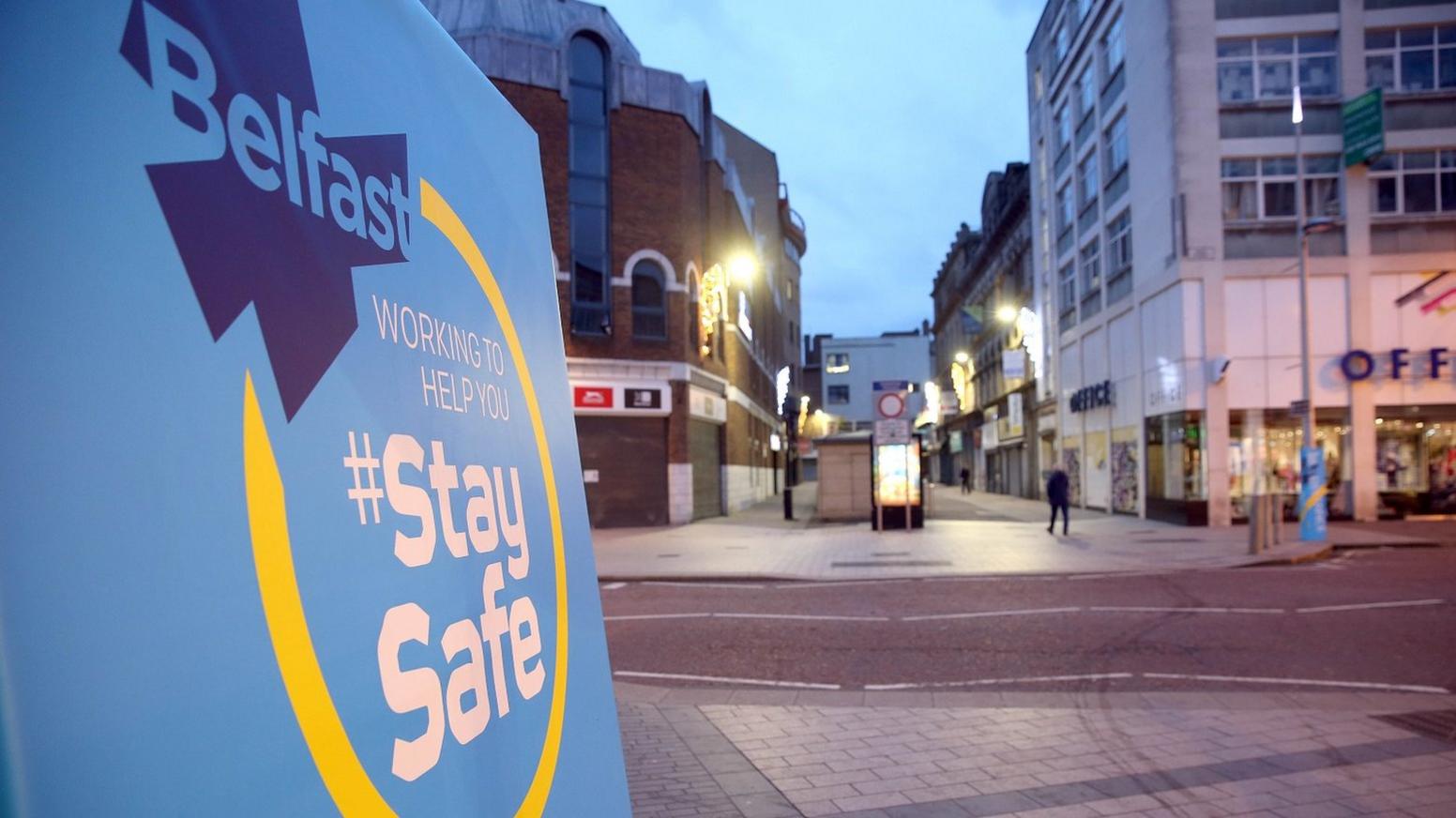Covid-19: Foster has 'full confidence' in NI's medical adviser
- Published
- comments

Arlene Foster told Stormont's weekly press conference she has confidence in the CMO
First Minister Arlene Foster has said she has "full confidence" in NI Chief Medical Officer Dr Michael McBride.
It comes after her party, the DUP, said health officials had been "overcautious" in recommending a phased return of NI schools.
The DUP had called for the executive to revisit the plan but Dr McBride said the medical evidence had not changed.
Health and education officials are to work together on further timelines for the return of all pupils to classrooms.
On Thursday, DUP Education Minister Peter Weir said his preferred option had been a full return to school on 8 March, and that he "wanted answers" from Dr McBride about why his advice remained against that.
All schools in England are to reopen on 8 March, but only a small number of pre-school, nursery and primary pupils will return in NI on that date.
Mr Weir said he did not want NI to be "out of sync" with the rest of the UK or "second-class citizens".
He said NI was in a similar position to England and it was therefore "hard to square the circle of Michael McBride and Chris Whitty being on the same page," considering the medical advice on reopening schools was different in the two jurisdictions.
East Antrim DUP MP Sammy Wilson also criticised health officials on Thursday, comparing Health Minister Robin Swann to "a poodle for an unaccountable chief medical officer".
Deputy First Minister Michelle O'Neill said it was "disrespectful" and "disgraceful".
Mrs Foster said "sometimes tweets would be better to be typed out and then deleted", adding it was not language she would have used.
Asked whether Dr McBride still had her support, Mrs Foster said he "absolutely" did.
"He has worked tirelessly, as indeed has the chief scientific adviser and deputy to bring us impartial advice and that's the key - impartial advice - then we as politicians have to decide on the best way forward.
"So absolutely Michael retains and will have my full confidence and that of my party."
What's happening with the plan for schools?
There have been no changes to the staggered approach, initially agreed by the executive last week.
But Mrs Foster said health and education officials will work together on further timelines for the return of all pupils to classrooms.
She said ministers indicated a desire at Thursday's meeting to avoid primary one to primary three pupils, who are due to return on 8 March, having to "revert back" to remote learning for a week from 22 March.
Deputy First Minister Michelle O'Neill said all ministers also recognised that it was important to get students back to classrooms quickly - but safely.
Under the current timetable, only pre-school, nursery and pupils in primaries one to three will return to classrooms in Northern Ireland on 8 March. After two weeks, they will resume remote learning so older pupils in years 12 to 14 can go back to school.


It looks pretty clear that at least part of the executive's plan is going to change, for the return of some primary school pupils at least.
No principal I spoke to thought it was a good idea to bring primary one to primary three pupils back for effectively nine days, given most schools are off on St Patrick's Day and to then send them home for a week of remote learning when years 12 to 14 are due to return.
It is probably one of the easier changes for the executive to make.
However there is still significant uncertainty for other year groups who don't yet have a potential date as to when they might return.
Whether there are major changes this side of Easter is hard to predict because obviously it will depend how ministers see the public health situation moving.

When will the roadmap for exiting lockdown be published?
Much of the executive's discussions on Thursday focused on the proposed pathway-to-recovery blueprint.
It is understood ministers received a presentation from interim Head of the Civil Service, Jenny Pyper, who leads the executive's Covid-19 taskforce.
Last week, the first and deputy first ministers said they would publish the plan on Monday 1 March.
But at Thurday's press conference, they said they wanted to ensure they "got it right", rather than prematurely publishing the document.
The plan is not expected to include indicative dates, but will set out criteria that must be met before restrictions on different sectors can be eased.
Mrs Foster said the executive would also take into consideration "not only local data but emerging evidence from other jurisdictions too".

Most businesses in Belfast city centre have been closed since Christmas
"We will keep to the standard of reviewing the regulations every three weeks, and every time we look at things we'll hope we can move further," she added.
In England and Scotland, recovery plans have been published that include target dates for easing restrictions - but the respective governments have said lifting of the rules will only happen if certain conditions are met.
In the Republic of Ireland, lockdown restrictions have been extended until 5 April.
Ms O'Neill said she hoped work on the executive's plan would continue over the weekend.
She added that she wanted to see "robust and co-ordinated quarantine measures" in place for travel across the island of Ireland, as part of the executive's overall response to manage the route out of lockdown.
NI's lockdown has been extended until 1 April, with a review due on 18 March.
On Thursday, five more Covid-19 related deaths were recorded by the Department of Health in Northern Ireland.

The department's coronavirus death toll now stands at 2,048.
A further 281 new positive cases of the virus have also been recorded.
There are also 341 people being treated for Covid-19 in hospitals, with 44 of those patients being treated in intensive case units (ICU), of those patients in ICU, 32 are ventilated.
The department's latest figures also show 491,593 people in Northern Ireland have now received their first Covid-19 vaccine.
Some 31,637 people have had both doses.
The rate of transmission for new cases in Northern Ireland is estimated to be between 0.8 and 1.05, according to the Department of Health.
There were 35 additional deaths reported in the Irish Republic, with 613 more cases confirmed.
It means there has been a total of 4,271 coronavirus-related deaths in the country, with 217,478 confirmed cases.

Are you worried about the new variants of coronavirus in Northern Ireland? Maybe you want to know when you can get vaccinated?
Send your questions to us.
We'll answer them live during Thursday's Coronavirus Catch-up with our Health Correspondent Marie-Louise Connolly.
Join us at 19:00 GMT on the BBC News NI website, iPlayer and BBC News NI Facebook Page.
If you are reading this page on the BBC News app, you will need to visit the mobile version of the BBC website to submit your question on this topic.

Related topics
- Published24 February 2021

- Published14 February 2021

- Published2 April

- Published29 July 2021
